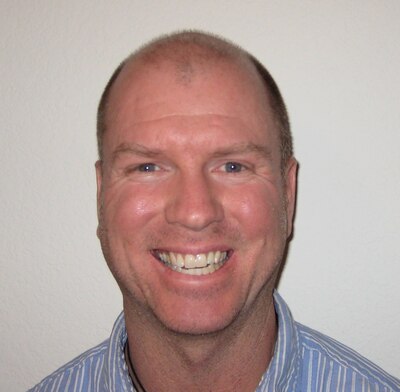Here, in a feature we call How I Teach, we ask educators who’ve been recognized for their work how they approach their jobs. You can see other pieces in the series here.
It was the start of the semester and Ted Halbert, an English teacher at Brighton High School north of Denver, had been warned. The mother of one of his students was extremely hard to handle, the other teachers said.
But Halbert didn’t wait for problems to flare. Instead, he contacted the boy’s mother early on, outlining his hopes for the teen and establishing a pattern of email back-and-forth that lasted through the year.
Halbert talked to Chalkbeat about his rule of thumb for communicating with the boy’s mother — and all parents, why he feels heartbroken when district tax levies fail, and how he uses a Metallica song to explore an anti-war novel with his students.
Halbert is one of 48 educators nationwide selected for the 2019 National Education Association Foundation Global Learning Fellowship. The goal of the program is to help teachers develop the skills to understand and act on issues of global significance.
This interview has been condensed and lightly edited.

Was there a moment when you decided to become a teacher?
Teaching is my second career. After graduating from Michigan State University with a degree in communications, I spent a year as a student with the international, cross-cultural, and performance-based organization Up with People. It was an incredible experience for me. I loved learning about the world and being in the world with diverse people and living with host families (I have lived with more than 140 host families on four continents). I was hired by Up with People and spent nine years with them — the last three as general manager. But, the organization ceased operations in December 2000 and I was out of a job.
I got a job working for Girls Inc. of Metro Denver as the director of new business and marketing but didn’t love it. But after school the girls would come to our facility for classes and I immediately figured out that I loved being around the learning environment and the learners.
And then, Sept. 11, 2001, happened. That day I made a vow to myself to make the most of my life and not wait for change. The next day I quit Girls Inc. and told the president that I was going to become a teacher. And so I did. I was 33.
How do you get to know your students?
From the first moment they walk in my classroom I do two things: First, I welcome them personally, by name, every day. Second, I try to find out something unique and interesting about each and every student and ask them about it as often as I can. This is an intentional process and must be considered carefully because there are some students who want to hide — they don’t want me to engage and interact — but I refuse to let them and eventually, we create a positive relationship based on growth and trust (and laughter).
Tell us about a favorite lesson to teach. Where did the idea come from?
Before reading the incredible novel “Johnny Got His Gun” by Dalton Trumbo, we listen carefully to Metallica’s song “One,” which was partially inspired by the movie based on Trumbo’s book. We draw what we think is thematically happening in the song, and pull lyrics as evidence to back up our ideas. This gets them engaged and excited to read the book. I mean, if Metallica wrote a song about it, right? So cool.
What object would you be helpless without during the school day?
Cool socks.
What’s something happening in the community that affects what goes on inside your class?
The refusal of the local community here in Brighton and the 27J area to support education through bonds or mill levies is absolutely maddening. Our textbooks are 25 years old. Our technology is outdated. Our rooms are packed with kiddos and when the bell rings at 7 a.m., some of them are barely awake. It truly takes the entire community to ensure the complete education of our young people and when a community does not step up, it breaks my heart. There is serious inequity in how we value our young people and something needs to be done about it. Regardless, I welcome every kid with enthusiasm and work my hardest so that they get the best education possible.
For the record: We have passed some bond issues, but only after making drastic decisions like split schedules (when 9th and 10th grades come early in the morning and 11th and 12th grade stay later) and pack our classes with kiddos. These actions wake up the community for a while so we can pass bonds so we can build new schools and facilities. Makes me sad … These kiddos are so amazing and they deserve better from their community.
Tell us about a memorable time — good or bad — when contact with a student’s family changed your perspective or approach.
I had a boy in my room and I was warned that his mom was “crazy” and impossible to manage. People who had the student in their class in other years would roll their eyes and wish me luck.
I reached out to her immediately and set up a relationship with her with very specific guidelines and goals. The goal, obviously, was the academic growth of her son, but I also made it clear that it was my goal that he have fun and be engaged, and want to come to class. Right off the bat, this impressed her and we were off to the races. The other goal (and this is so important when working with individual parents) was that our email communication would not take longer than 20 seconds to create and send. I’m rather serious about this with parents. I will keep in touch with them on an individual basis, but it must be concise and honest. The mother and I built a great relationship based solely on the health and success of the child. We had an incredibly successful year. The other teachers would grumble and complain, and I would just smile.
What part of your job is most difficult?
Understanding why education and young people and teachers aren’t more valued by our society is by far the most difficult part of my job. My students are the economic drivers of our future and deserve the best we can offer them. Where are the adults? Where are the politicians? Where is the support?
What was your biggest misconception that you initially brought to teaching?
My biggest misconception was that the students would be difficult to manage. I was wrong. They are wonderful, curious, funny, smart, and engaged and they give me hope. It is society and the community not supporting us that I didn’t expect.
What are you reading for enjoyment?
I am always reading multiple books, usually one fiction and one non-fiction. Right now, I am inhaling Colson Whitehead’s “The Underground Railroad” (wow) and “The Bounty: The True Story of Mutiny on the Bounty” by Caroline Alexander.
What’s the best advice you’ve received about teaching?
Teaching is about relationships. Build the relationships and they will come.

